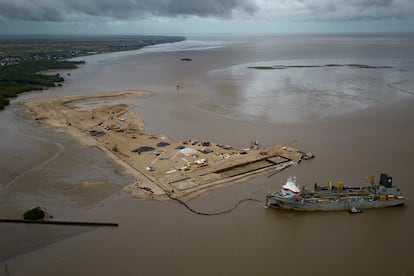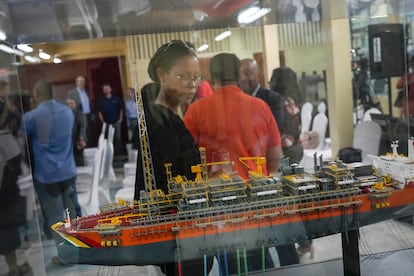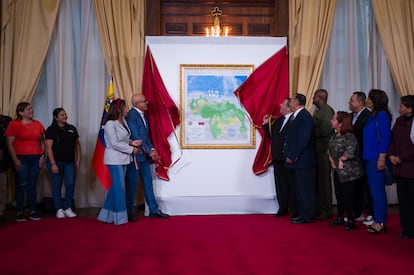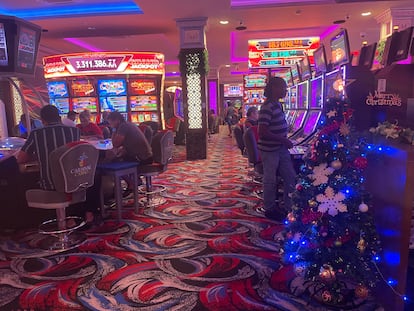Guyana, the small country swimming in oil is now in Maduro’s sights
The country that Venezuela is confronting over the Essequibo region registers the highest economic growth in the world thanks to the discovery of crude oil deposits


At Amici, Georgetown’s most exclusive restaurant, a plate of wagyu beef to share costs $350, and dessert costs a minimum of $20. Every day, Jamaican Gregory Lynch, a huge man dressed in black from head to toe, opens the door to ministers, magnates, oil company employees, Indian music singers, soap opera actors, and men whose fortunes are of dubious origin. Construction trucks cause traffic jams day and night. Getting here by plane from another country in the region costs $1,500. A hotel on the coast charges $700 a night. Taxi drivers grimace if they are offered less than $30. Supermarkets are full of imported products that cost an arm and a leg. The local cricket team, the Amazon Warriors, are having a new stadium built next year. In the small country of Guyana, money grows on trees.
For decades, this former British colony has remained hidden from the eyes of the world. It would be difficult for someone from the outside to locate it on a map. It was the second-poorest country in Latin America when its fortunes suddenly changed in 2015. Right now, it is the fastest growing economy in the world, according to the IMF. The American ExxonMobil and its partners, Hess and the Chinese Cnooc, found more than 11 billion barrels of oil off the Guyanese coast. It is a discovery that the country could live comfortably off for the next 20 years. Foreign investment and infrastructure construction have skyrocketed. Experts expect that, over time, Guyana’s 800,000 inhabitants will have one of the highest per capita incomes in the world.

However, an issue from the past has come back to rain on Guyana’s parade. Venezuela, which borders the country, claims the Essequibo region as its territory. The region makes up two-thirds of Guyana and was granted to the country in an arbitration award in 1899. Now that oil deposits have been discovered off the coast of the jungle region, twice the size of Maine, the president of Venezuela, Nicolás Maduro, has unveiled a new map of his country that includes Essequibo, which is quite the declaration of intent. Maduro and his Guyanese counterpart, Irfaan Ali, will meet this Thursday in Saint Vincent and the Grenadines, the country that is temporarily presiding over Celac and is acting as mediator. The international community has voiced its concern that the disagreement is escalating into a military conflict.
“The Venezuelan threat has caused concern in Guyana, I’m not going to lie,” Mark Phillips, the country’s prime minister, says in his office. “But Venezuela cannot stop our prosperity. You cannot annex Essequibo. What Mr. Maduro says is not possible. We will never, ever agree to any request from Maduro and his government. We respect the work of the [International Court of Justice, where the conflict is being resolved],” Phillips says.

The effect of the oil boom is shocking. In 2022, Guyana’s GDP grew by 62%; a 37% growth is projected for this year. Right now the country is producing 400,000 barrels a day. Authorities and oil companies plan to increase production to 1.2 million in 2027. Crude oil experts had not seen such an explosion until now. The prime minister explains that with this money the government wants to improve education, infrastructure (currently very poor), universities, and hospitals. The government also plans to connect Georgetown, the capital, with direct routes to other cities and build a highway to the border with Brazil. The country is full of cranes, scaffolding, and workers working 24 hours a day.
Going from the dark night of Georgetown, where there is little lighting, to the halls of the Carnival Casino is momentarily blinding. Customers play poker, roulette, and feed coins into slot machines. Chinese people working as dishwashers can spend $10,000 in an evening. Musa Deveci from Turkey is married with three children, and a fan of (soccer team) Fenerbahçe. He is also one of the people who run the casino. “It’s full all the time. There are a lot of foreigners, including visitors from Canada and the United States. There are people who come from outside to set up restaurants, shops, and so on. You can tell that Guyana is fashionable,” he says. At the top there is another manager, Metin Kaya, who is also Turkish. Why are the people in charge here all Turks? “Where there is a casino, there is a Turk. We handle them very well,” says Kaya. He is married to a Colombian woman, and he speaks five languages. He is more skeptical about the consequences of the oil boom. He does not notice it as much at the gaming tables, although his boss, an Israeli tycoon with mansions in the best capitals in the world, is going to build a hotel-casino with more than 300 rooms next year. Looking to the future.
Theodore Kahn, an analyst for the Andean region at Control Risks, has seen Guyana’s growth firsthand. Overall, he says, opportunities have expanded and the situation is expected to continue improving. The government budget has increased. However, there is a bottleneck on the administrative side. The investment and arrival of foreign companies has exceeded the capacity of public agencies, which translates into slow procedures and permits being held up. Finding labor or construction materials is not easy at all. The economy is growing beyond its means. “There is a growing dependence on oil, which already makes up 70% of the economy. This has created a risk for when the market falls. At some point the price will collapse. The big question is how Guyana is going to respond,” explains Kahn.

Another challenge is that all this easy money is distributed fairly and does not end up in the hands of a corrupt elite, as has happened in other countries that came unexpectedly into great wealth. The government alternates, not without racial tensions or accusations of corruption, between two political movements. One is led by the Afro-Guyanese, the descendants of slaves, and the other by the Indo-Guyanese. Right now the Indo-Guyanese People’s Progressive Party (PPP) is in power, whose campaign criticized the agreements with Exxon. But when it came to power, it swept any dispute under the rug. William Scott, a clothes retailer from Anna Regina, a town in the disputed region of Essequibo, believes that prosperity is not noticeable in humble people like him. The government expects the average per capita income to rise from $10,000 to $30,000 in a few years. Scott, however, sees the present as a burden that will weigh equally in the future: “I feel like the usual people are going to benefit.”
Highways have been filled with ExxonMobil billboards announcing the creation of jobs and promising cheaper energy. The company has invested $1 billion in community programs. Smiling, modern people appear in idyllic, almost movie-like spaces in their advertisements. That is still not the reality of Guyana, which has to deal with a poverty rate of 48%, poor roads, very precarious employment, and rampant inflation. Oil represents a buoyant future for a country still under construction.
Sign up for our weekly newsletter to get more English-language news coverage from EL PAÍS USA Edition
Tu suscripción se está usando en otro dispositivo
¿Quieres añadir otro usuario a tu suscripción?
Si continúas leyendo en este dispositivo, no se podrá leer en el otro.
FlechaTu suscripción se está usando en otro dispositivo y solo puedes acceder a EL PAÍS desde un dispositivo a la vez.
Si quieres compartir tu cuenta, cambia tu suscripción a la modalidad Premium, así podrás añadir otro usuario. Cada uno accederá con su propia cuenta de email, lo que os permitirá personalizar vuestra experiencia en EL PAÍS.
¿Tienes una suscripción de empresa? Accede aquí para contratar más cuentas.
En el caso de no saber quién está usando tu cuenta, te recomendamos cambiar tu contraseña aquí.
Si decides continuar compartiendo tu cuenta, este mensaje se mostrará en tu dispositivo y en el de la otra persona que está usando tu cuenta de forma indefinida, afectando a tu experiencia de lectura. Puedes consultar aquí los términos y condiciones de la suscripción digital.








































